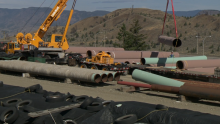KAMLOOPS — Trans Mountain (TMX) has had a major setback in its expansion project through Kamloops.
The pipeline twinning includes a segment beneath the Thompson River that must be installed after Horizontal Directional Drilling (HDD) is completed.
In a statement emailed to CFJC Today, Trans Mountain says installation of the pipe in the segment beneath the river encountered “technical challenges” that require the entire HDD process to be restarted.







